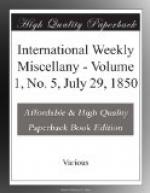That to my father was a heavy hit. “It was a devil of a sacrifice, Mary,”—and he sighed, “to give up the sweetest pack that ever man rode to; one, that for a mile’s run you could have covered with a blanket—heigh-ho! God’s will be done;” and after that pious adjuration, my father turned down his tumbler No. 3, to the bottom. The memory of the lost harriers was always a painful recollection, and brought its silent evidence that the fortunes of the Hamiltons were not what they were a hundred years ago.
“With all my care,” continued my mother, “and, as you know, I economize to the best of my judgement, and after all is done that can be done, our income barely will defray the outlay of our household.”
“Or, as we used to say when I was dragooning thirty years ago, ’the tongue will scarcely meet the buckle,’” responded the colonel.
“I have been thinking,” said my mother timidly, “that Frank might go to the bar.”
“I would rather that he went direct to the devil,” roared the commander, who hated lawyers, and whose great toe had at the moment undergone a disagreeable visitation.
“Do not lose temper, dear James,” and she laid down her knitting to replace the hassock he had kicked away under the painful irritation of a disease that a stoic could not stand with patience, and, as they would say in Ireland, would fully justify a Quaker if “he kicked his mother.”
“Curse the bar!” but he acknowledged his lady wife’s kind offices by tapping her gently on the cheek. “When I was a boy, Mary, a lawyer and a gentleman were identified. Like the army—and, thank God! that is still intact, none but a man of decent pretensions claimed a gown, no more than a linen-draper’s apprentice now would aspire to an epaulet. Is there a low fellow who has saved a few hundreds by retailing whisky by the noggin, who will not have his son ‘Mister Counsellor O’Whack,’ or ‘Mister Barrister O’Finnigan’? No, no, if you must have Frank bred to a local profession, make him an apothecary; a twenty pound note will find drawers, drugs, and bottles. Occasionally he may be useful; pound honestly at his mortar, salve a broken head, carry the country news about, and lie down at night with a tolerably quiet conscience. He may have hastened a patient to his account by a trifling over-dose; but he has not hurried men into villainous litigation, that will eventuate in their ruin. His worst offense against the community shall be a mistaking of toothache for tic-douloureux, and lumbago for gout—oh, d——n the gout!”—for at that portion of his speech the poor colonel had sustained an awful twinge.
“Well,” continued the dame, “would you feel inclined to let him enter the University, and take orders?”




